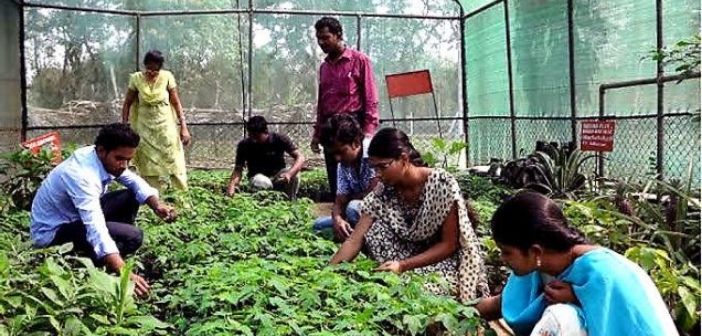
“The agriculture sector is seen as the savior in times of crisis,” says, Dr. Satender Arya, CEO, Agriculture Skill Council of India (ASCI).
India’s agricultural sector has shown resilience amid the adversities of COVID-19 induced lockdowns. The COVID-19 crisis has also exposed the vulnerability of India’s agriculture, supply chain, food markets, and availability of labour.
We interacted with Dr. Satender Arya, CEO, Agriculture Skill Council of India (ASCI) to understand the challenges of the agriculture sector, how ASCI has continued skilling amidst the ongoing crisis, the impact of technology, and the need to reskill and upskill the existing workforce among others.
These are few excerpts from our conversation, you can watch the full video interview on our YouTube channel, for which the link is given below.
Q: What is the impact of COVID-19 on the agricultural sector?
A: The agriculture sector is seen as the savior in times of crisis. A lot of people who returned to their native places have started agriculture. Few of them got engaged in harvesting operations in peri-urban areas. Therefore, COVID-19 did not impact the agriculture sector in terms of labour but it has impacted it in terms of disruption in the supply chain.
During these disruptions, there were instances of fruits and vegetables getting spoiled. However, immediate improvement was seen as fruits and vegetables were being supplied through online platforms.
Harvesting operations have not been impacted much. This can be evidenced by the fact that even without a great improvement in the monsoon season last year, we are expecting a yield of 305 million metric tons. This year, the agriculture sector is expected to contribute around 19.5-19.9 % of the entire GDP.
However, during the pandemic year, there were many reforms in the agriculture sector. These reforms can get the right kind of prices and stability for farmers. There is also going to be a demand for new skill sets in agriculture and other priority areas.
Q: How is ASCI continuing skilling during the pandemic?
A: During the lockdown, training and skilling have become really tough. Our first priority last year was to complete the pending programmes. In an informal sector like ours, we could not completely shift to an online mode of learning.
The blended learning model was a solution for a few, but not for agriculture, as most of the workers were illiterate. There was no internet in rural areas. People could not read when we sent any reading materials. These were some of the challenges while delivering training. So, we delivered training sessions wherever the services and digital equipment were available.
Many sectors including agriculture have developed their own Learning Management Systems and are also sharing their skilling resources with other sectors. Department of Fisheries, Ministry of Agriculture and Farmers’ Welfare, Indian Council of Agricultural Research have agreed to share their resources with us.
The government was kind enough to extend help to our sector in terms of mandi operations. There is also an expectation of a huge crop in terms of pulses and staples. In the Kharif season, the rain-fed crops will also be benefited. When there is stability and prosperity, people can participate in our skilling programmes at peace.
Due to the pandemic, electronic platforms are getting much more robust. Farmers are now able to sell their produce through digital platforms. So, it is important for farmers to be able to engage with such companies and make them aware of their produce. This is a new skill set we need among the farmers.
e-NAM – National Agricultural Market, is another portal where farmers can sell their produce through electronic means. Safety and hygiene are also a concern during the pandemic.
There is a need to upskill the farmers to help them use the newer methodologies of selling their produce.

Q: Are there any skilling programmes to support entrepreneurship in the agriculture sector?
A: Entrepreneurship cannot be taught separately in agriculture, but the financial literacy component should be a part of every Qualification Pack (QP). Marketing the produce, how to calculate the cost of the produce, etc. should be taught to the farmers, as farmers are running their solo micro-enterprise.
Every farmer is a micro-entrepreneur as they take care of their own crop. We need to sharpen their entrepreneurial skills through the skilling programmes. When it comes to entrepreneurship, there is a question on how people can get better returns, how they can join organisations such as Farmer Producer Organisations (FPO).
The government of India has established around 10,000 FPOs through NABARD. To help farmers aggregate to form FPOs, we have a job role called Group Farming Practitioner.
Q: What do you have to say about the doubling of farmer’s income?
A: Doubling the farmer’s income has two components – getting a better price for the produce and reducing the cost of producing. To be able to achieve that, one must not only increase the profitability but also mitigate the risk.
Farmers must have allied sources of income through dairy, poultry, and fishery. Farmers need to change their focus to horticulture for a better profit. Rather than focusing on the staple crop, they have to change to vegetable cultivation and fodder. In traditional areas like Punjab and Haryana, there are skilling programmes on horticulture crops. Only when farmers focus on allied sources of income, doubling their income can become a reality.
Q: How is ASCI promoting apprenticeships?
A: We are making small beginnings in an apprenticeship with a new curriculum on Landscaping, Gardening, and Milk Delivery. Few companies have come forward to take in apprentices for micro-irrigation technicians as well.
For almost 16 job roles, we developed a curriculum from an apprenticeship perspective. In the first year, we had around 47 apprenticeships and in the second year, the number increased to 857. This is a huge growth for the agriculture sector. However, still, a lot of awareness creation is needed from the Sector Skill Council as well as other stakeholders.
We are in discussions with NCML (National Collateral Management Services Limited) for apprenticeships in the agriculture warehousing sector.
Q: How is technology going to be a part of the agriculture curriculum?
A: Agriculture business is going to flourish by using digital technologies, right from sourcing to marketing. We need to keep in mind that, India has small and fragmented landholding. Therefore, the economic viability of the technology and the literacy levels of farmers is very important.
The focus is on using the technology in small chunks. A farmer can be benefitted from good agricultural practices like the real flow of data, low-cost mechanization, GIS mapping, etc. Companies can help farmers improve their farming practices.
There are certain automated techniques that lead to better execution and productivity enhancement. For example, climate can be assessed by Artificial Intelligence. One can also come up with various kinds of modules for data analytics to re-design the business modules.
Technology is also used for commercial activities like e-auction and e-payments. Farmers can also send a photo of the crop to Kisan Call Centres for advisory.
Technology is not going to take away jobs. But it will address the natural attrition occurring in the agriculture sector. We need to reskill and upskill the farmers, farmworkers and supervisory level people to make the most of technology.
Technology is going to make agriculture appealing to the youth and attract them towards this sector. Youth can also see jobs in agriculture as technology-oriented.
Q: Could you please tell us if there are any in-demand job roles in the agricultural sector?
A: Agriculture has been a supply-led sector and this approach is slowly changing. There is a slight requirement in organic farming and dairy farming, but there is no demand right now. We encourage people to go for new generational job roles. These job roles would need upskilling programmes through certain competencies.
A short-term module called RPL (Recognition of Prior Learning) is introduced through bridge training for the safe usage of pesticides and for the use of drones. Therefore, at this point in time, we cannot speak about in-demand job roles in agriculture.
Q: What is the importance of RPL in the agriculture sector skilling?
A: RPL benefits the unorganized sector the most. Apart from leading to income enhancement, the important aspects of RPL in agriculture are:
- RPL gives vocational identity to the agriculture sector
- RPL certification enables access to credit
- The certificate also enables access to market
- RPL helps in recognizing women as an economically productive
Also read: Need for vocational training in Agriculture and Food Processing – https://nationalskillsnetwork.in/need-for-vocational-training-in-agriculture-and-food-processing/
Q: How can youth contribute to the rural economy?
A: Retention of youth in agriculture is a common problem across the world. Due to the pandemic, many youth have decided to work in their native places. Government schemes like Aatmanirbhar Bharat, PM Mathsya Sampada Yojana, etc. are also aiming at making urban-rural India self-sufficient. Youth needs to become independent and look out for opportunities in their own place. This will also prevent urban migration.
If a youth becomes a successful entrepreneur from their place, other youth would also want to follow the same path.
Q: What about the capacity building of the trainers in the agriculture sector?
A: For our sector, training of trainers does not depend on the qualification of the trainer but on the experience they have. Experience in fields of the vineyard, gardening, vegetable growing, etc. is what we look at. We are very happy to train and certify them.
ASCI has tie-ups with 50+ agricultural universities where we conduct our training of trainers programme either in residential or online mode.














